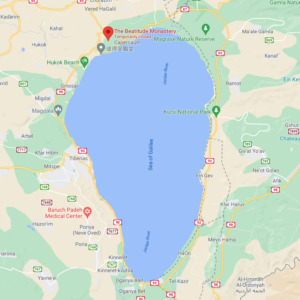
“If we live in the Spirit, let us also walk in the Spirit.” Galatians 5:25
Each of us finds Jesus through unique experiences. Each of us has a story, a testimony, of how we met the Lord and how He changed everything. Yet what many of us do not know is the Bible gives us a distinct road map showing us how to find Him. The map is tucked into Matthew 5, where Jesus Himself gives us eight waypoints in His own words.
Drawing the Map
Matthew 5-7 is a famous transcript of Jesus’ Sermon on the Mount. His notoriety at this early point of His ministry was incredible. News of His miraculous healings, deliverances from demon-possession, and amazing teachings had spread far and wide.
Now, on the Mount of Beatitudes on the shores of Lake Gennesaret (Sea of Galilee) near Capernaum, Jesus was about to give the teaching of His earthly life. And the first thing He taught was how to find Him. He gives out His map.
The Mount of Beatitudes is also known as Mount Eremos, a Greek word meaning solitary or uninhabited. The hillside is a vast open area, plenty big enough for large crowds to gather. A fourth-century pilgrim named Egeria tells of a cave located on the northwest shore near the Seven Springs (“Ein Sheva”) as the place where Jesus ascended and gave His discourse. Archaeologist Bargil Pixner supports the pilgrim’s assertion, saying,
“The terrace above this still existing cave, called Mughara Ayub, must be considered the traditional place of the Sermon on the Mount. The hillcrest of Eremos indeed offers a magnificent view over the entire lake and the surrounding villages. The cragginess of this hill meant it was left uncultivated and enabled Jesus to gather large crowds around him without causing damage to the farmers.”
The eight-sided Church of the Beatitudes, built in 1938 for an order of Franciscan nuns, now sits on the hillside. Each side of the church is a commemoration of the eight Beatitudes.
[Click here to see amazing pictures of the Mount of Beatitudes and the church]

The 8 Waypoints
Named from the initial words of Jesus’ sermon (beati sunt, “blessed are”), the Beatitudes describe those who continually exhibit certain qualities that reflect God’s nature and character. Those who do Jesus calls blessed. He tells us eight specific ways to receive His blessing. Each is a waypoint on Jesus’ map to find Him and His heart.
Map Way Point #1: “Blessed are the poor in spirit.” Matthew 4:3
Those who are poor in Spirit are not depressed or sad. Instead, Jesus is talking about those who are spiritually bankrupt and feel lost without God’s grace. They have deep humility and recognize they need a Savior. And they know they cannot navigate life without Him.
Some Bible teachers say this Beatitude means we need to be humble and realize all our blessings come from God. If we are humble, we are open to repentance and more willing to respond to the Holy Spirit. While this teaching is true, that’s not what Jesus was saying here. It is better to realize your need for Him.
Map Way Point #2: “Blessed are those who mourn.” v.4
People who mourn are not mourning over death. They are mourning over sin—their own and those of the world—with godly sorrow. The Bible tells us if we die in our sin, we will be eternally separated from God with no hope of rescue. The reality should make everyone take pause. As believers, we should be moved to mourn.
When we mourn sin as God does, the Holy Spirit leads us to repentance so we may live a life of righteousness in close relationship with Him. Our mourning should also compel us to lead others to Him.
Map Way Point #3: “Blessed are the meek.” v.5
The Greek word for meek is praus (“prah-ooce),” which means mild, humble, and of a soothing disposition. Some scholars also believe meekness is having great self-control over retaliation by the power of the Holy Spirit. In no way does it mean weakness, as Western cultures presume. It is quite the opposite. Having self-control when you feel like taking revenge requires great, divine power.
The purpose of meekness is to set a peaceful, soothing example of who God is. Putting on our shoes of peace (Ephesians 6:15), we reflect His character and nature to the people around us, lowering the temperature and bringing comfort to them.
King David also spoke of being meek in Psalm 37:11 and what we can expect when we are.
“But the meek shall inherit the earth and shall delight themselves in the abundance of peace.”

Map Way Point #4: “Blessed are those who hunger and thirst for righteousness.” v.6
If you “hunger and thirst for righteousness,” you are seeking the kingdom of God. You long for His justice and a loving relationship with Him. You long “to do right by” Him, and you long for others to do the same. It is not about adhering to laws and rituals as the Pharisees did or anyone who still tries to find salvation by checking all the right boxes.
The fact is we cannot create our own righteousness. It does not exist (Romans 3:23). We cannot obtain salvation or eternal life on our own because not one of us is good enough (Romans 3:10). Only Jesus can satisfy what we seek—a right relationship with God that comes through Jesus’ atoning sacrifice on the cross.
“For they being ignorant of God’s righteousness and seeking to establish their own righteousness, have not submitted to the righteousness of God. For Christ is the end of the law for righteousness to everyone who believes.” Romans 10:3-4
Map Way Point #5: “Blessed are the merciful.” v.7
All mercy comes from God, and He calls us to be equally merciful. It is important enough that Jesus repeats it in Matthew 6:14-15.
“For if you forgive men their trespasses, your heavenly Father will also forgive you. But if you do not forgive men their trespasses, neither will your Father forgive your trespasses.”
Jesus is distinguishing between the mercy we receive when we first come to Christ and the mercy we show others in everyday situations, including our families. If we cannot forgive, Jesus says the Father will withhold it from us. James addresses this in James 2:13, where he says, “For judgment is without mercy to the one who has shown no mercy. Mercy triumphs over judgment.”
Being merciful like God was a radical idea for its time. Showing mercy and compassion was (and still is in many cases) largely an afterthought. But Jesus challenges us to be forthright and aggressive in mercy, knowing that the Father has already given it to us.
Led by the Lord, the prophet Micah gave the same reminder centuries earlier before Jesus walked the earth.
“And what does the Lord require of you but to do justly, to love mercy, and to walk humbly with your God.” Micah 6:8
Map Way Point #6: “Blessed are the pure in heart.” v.8
The Pharisees often practiced and preached that the cleansing of one’s body is ritually required to see the kingdom of heaven. But Jesus makes the point that it is more important to have a pure heart–one cleansed of unforgiveness and hate–than to have a pure body because a pure heart will produce pure lives. Pastor Michael Vanlaningham from the Moody Bible Institute describes it this way:
“Pure in heart refers to those who are morally unstained, clean, free from duplicity or filth in their relationships with others.”
Jesus instructs purity not just as a matter of faith but also as a matter of fact. The pure in heart will personally experience the glory of heaven one day if they can remain faithful.
“They shall see His face, and His name shall be on their foreheads.” Revelation 22:4
Map Way Point #7: “Blessed are the peacemakers.” v.9
During the time of Jesus’ ministry, political and religious chaos was everywhere. Many Jews were falling away from the faith and giving into idol worship while other Jews became stricter. Rome had taken control of Israel, taxing many people beyond their means to pay and detaining anyone perceived to be a troublemaker.
In the middle of such discontent and anger, Jesus instructs His audience to be peacemakers, to be actively causing unity and reconciliation. It was something many found (and still find) very difficult to do. Like His teaching about mercy, the idea of being a peacemaker is essential enough that He repeats it in verses 44-45.
“But I say to you, love your enemies, bless those who curse you, do good to those who hate you, and pray for those who spitefully use you and persecute you, that you may be sons of your Father in heaven.” Matthew 5:44-45
The apostle Paul also emphasized the importance of peace several decades later in his letter to the Christians in Rome.
“If it is possible, as much as depends on you, live peaceably with all men. Do not be overcome by evil but overcome evil with good.” Romans 12:18,21
It is important to note the peace Jesus is talking about is not just peace with others; it is also about the peace we experience when we have a relationship with Him. His peace in us allows us to extend it to others. It is why we can pray for our enemies, bless those who curse us, and do good even when no one else will.
Just as Jesus reconciled us to the Father through His death on the cross, we must also reconcile others.
Map Way Point #8: “Blessed are those who are persecuted for righteousness’ sake.” v.10
Jesus knew His teaching was and would always be very radical. The world does not know how to respond to such a great level of love, and so it consequently and often categorically rejects it. But Jesus says we are blessed despite persecution, which He explains further in verses 11 and 12 of Matthew 5.
“Blessed are you when they revile and persecute you and say all kinds of evil against you falsely for My sake. Rejoice and be exceedingly glad, for great is your reward in heaven.”
Apostles Peter and James, as well as many others, knew what it meant to be persecuted for their faith. Being a teacher of Christianity was not easy and often caused violent protests or even death in first-century Israel. Yet, they continued to preach the importance of salvation through Christ and encouraged those who believed.
“Indeed, we count them blessed who endure. You have heard of the perseverance of Job and seen the end intended by the Lord—that the Lord is very compassionate and merciful.” James 5:11
“If you are reproached for the name of Christ, blessed are you, for the Spirit of glory and of God rests upon you. On their part, He is blasphemed, but on your part, He is glorified.” 1 Peter 4:14
Persecution is often beyond our control. But God promises that if we endure, if we continually pursue righteousness (doing right by God and others), He will bless us to the glory of His name.

Bearing Fruit
Jesus’ map in the Beatitudes presents eight waypoints how to find Him and His heart. We must,
- Recognize our spiritual poverty
- Mourn over sin, ours and the world’s
- Practice meekness and gentleness
- Hunger and thirst for God’s righteousness
- Be consistently merciful
- Practice moral purity
- Seek to implement God’s peace and unity
- Endure in persecution for our faith
In doing so, Jesus promises us great rewards in heaven. He promises,
- Comfort
- Inheritance of the earth (see Revelation 21:1)
- Satisfaction by God’s righteousness
- Forgiveness
- An opportunity to see into God’s heart as we display his divine attributes
- The title “sons of God,” equivalent to an angelic title to those who reflect God’s glory; a special blessing
Most of all, we receive the kingdom of heaven, which Jesus bookends the Beatitudes in verses 3 and 10.
The eight points on Jesus’ map not only helps us find Him as His nature blends with ours but also bears fruit. Our fruit is the evidence we have found Him, and we follow Him daily. Galatians 5:22-23 details the godly fruit God is looking for in us.
“But the fruit of the Spirit is love, joy, peace, longsuffering, kindness, goodness, faithfulness, gentleness, self-control.”
Notice the overlap between Jesus’ words in Matthew 5 and Paul’s words in Galatians 5. Both emphasize almost the exact same things: peace, patience, love, meekness and humility, mercy, and, above all, love.
Jesus shows us the way to His heart. Paul illustrates the changes we make in our lives once we do. The result is a closer relationship with the Lord and the reflection of His glory in our everyday lives.
“If we live in the Spirit, let us also walk in the Spirit.” Galatians 5:25
If we have found Jesus, if we have followed the map and found His heart, may we walk in the power of the Holy Spirit so the evidence of His love, mercy, and peace are plainly evident to others. In so doing, we will see the kingdom of heaven.
